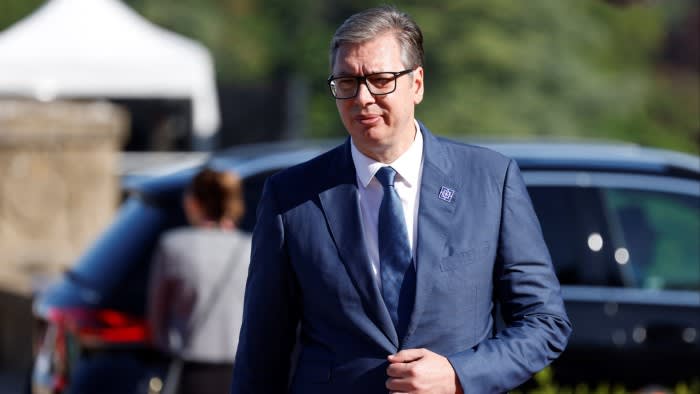Roula Khalaf, Editor of the FT, selects her favourite stories in this weekly newsletter.
Serbia has pledged not to sell lithium to Chinese carmakers, promising to favour European car companies such as Mercedes-Benz, Volkswagen and Stellantis when it develops one of the world’s largest deposits of the metal.
Serbia’s President Aleksandar Vučić made the commitment in an interview with Handelsblatt hours before hosting German Chancellor Olaf Scholz in Belgrade, where the two leaders will sign a deal on developing Europe’s biggest lithium mine.
Vučić is also expected to sign a memorandum of understanding on creating a “strategic partnership” with the EU covering critical raw materials, battery value chains and electric vehicles.
The development of the Jadar deposit, in the north-west of Serbia, is expected to deliver a significant boost to Europe’s EV industry. Vučić says Serbia will produce 58,000 tonnes a year of lithium, or 17 per cent of EU demand. That would be enough for 1.1mn electric cars.
Vučić said Chinese carmakers had expressed an interest in buying the lithium, but “we told them that we are discussing this issue with the Europeans. We are loyal to Europe . . . The EU needs lithium and we want to strengthen our connection with the EU.”
Serbia called off the lithium project two years ago but it will now give Rio Tinto the green light to develop it after receiving guarantees from the Anglo-American miner and the EU that address the country’s concerns over environmental standards at the mine.
Recommended
The revival of the deal with Rio Tinto and the EU’s involvement are seen by western officials as an important signal of Serbia’s geopolitical alignment at a time when the country is being courted by China, Russia and the Gulf states.
Serbia has been an EU candidate country for more than a decade but the accession process has been slowed by concerns in Brussels over the country’s commitment to the rule of law, corruption and the status of its former province Kosovo. It is one of only two European countries not to have imposed sanctions on Russia over Moscow’s full-scale invasion of Ukraine.
Vučić said Serbia wanted to develop a full lithium value chain at home, including battery factories, and so would only sell some of the lithium mined at the Jadar site abroad as raw material.
He said the country had received “positive feedback” from its talks with European carmakers, including Mercedes, VW and Stellantis.
The German auto industry has welcomed Serbia’s decision to develop the mine. Hildegard Müller, head of the VDA, Germany’s main auto lobby, described it as an “important and right signal” to secure the raw materials that are “essential” for European EVs.
However, domestic opposition to the lithium project remains strong in Serbia. The opposition environmentalist movement Kreni-Promeni (Move, Change), which blocked roads and highways to force the government to mothball the project two years ago, said the mine would result in the “ecological destruction of Serbia”.
A poll by the research institute New Serbian Political Thought showed that more than half of Serbs oppose the lithium mine. Just a quarter support the project, it added, though that number rises to 33 per cent when German and EU environmental guarantees are factored in.
Opponents are frustrated at what they see as the west prioritising economic interests over Serbia’s democratic credentials.
“We don’t need Scholz to come and guarantee to us what will happen in Serbia,” opposition leader Dragan Đilas told news channel N1. “Scholz guarantees things to the citizens of Germany . . . The authorities in Serbia steal elections, persecute political opponents, constantly lie, telling citizens that we live in a phenomenal economy.”
Milos Damnjanovic, an analyst at BIRN, a Belgrade think-tank, said a lot will come down to popular trust. “Do you believe Vučić when he says he will bring in the investments, and then hold Rio to account on the environment? If you do, you’ll support it, if not, you’ll be against it.”
Damnjanovic added: “If people block bridges and highways again — and if Vučić senses there is support behind them — the project could be stopped.”
Source link : https://www.ft.com/content/8f2a4385-9d8f-4896-a4bd-6d95b393e4cb
Author :
Publish date : 2024-07-18 13:55:04
Copyright for syndicated content belongs to the linked Source.
